The diseases described above in the heading are more or less teased every one in his life time. Allergies and common cold are the problems which arise very frequently. To treat these diseases through juices is very easy.
COMMON COLD
A cold is a viral infection of the upper respiratory tract. It is very contagious, and incubation time is 18 to 48 hours in length. Lasting immunity does not develop.
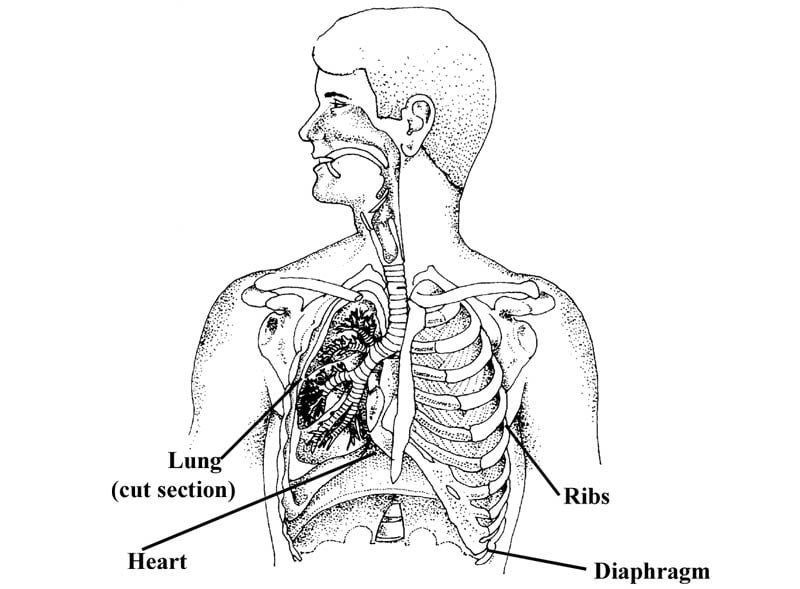
Cold symptoms include congestion of nasal passages with a watery discharge, sneezing and headache. A cold may also be accompanied by a dry sore throat, fever, bodyaches, fatigue and chills.
General Recommendations
The most effective method of preventing a common cold is to strengthen the immune system. More than one or two colds a year signals weakened immunity. If frequent colds are experienced, it is advisable to be checked for food allergies. A poor diet, physiological and psychological stress, and drug use (including the use of alcohol and tobacco) can all weaken the immune system.
When a cold ‘catches’ you, there are steps you can take to shorten the recovery time.
Get plenty of rest in bed : Jobs and other obligations often force us to neglect our body. But lack of rest can hinder the body’s defence mechanisms and prolong infection. When you rest in bed, and especially when you sleep, powerful immune strengthening substances are released, enhancing the potency of your immune findings.
Drink plenty of fluids : The mucous membranes lining the respiratory tract must be kept hydrated. When they become dry, they offer a desirable breeding ground for viruses. A moist respiratory tract repels viral infections. Use a vaporizer, facial mist spray, or facial steamer and drink liquids throughout the day.
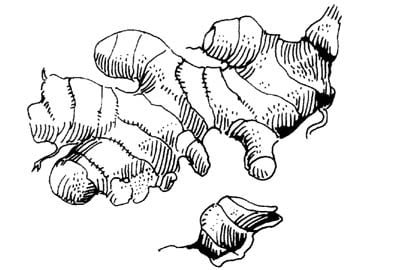
Take warm ginger baths : Cut off several slices of ginger root and float them in a tub of warm water. Soak for about twenty minutes and have a cup of Ginger Tea while you relax in the bath.
Take hot footbaths : Dissolve a tablespoon of mustard powder in a bucket of hot water and soak your feet for approximately ten minutes. Wrap your head in a towel at this time to increase your body heat.
Use lavender oil and eucalyptus oil to clear your throat and nose : Put six to eight drops of lavender oil or eucalyptus oil in a large pan of boiling water and reduce heat to a simmer. Wrap your head in a towel and inhale. These oils can be purchased at health food stores and from herbalists. Do not use this treatment during pregnancy. Use only half this amount of oil for children and do not use for infants.
Dietary Modifications
Avoid all sweets. Even fructose, honey, and orange juice have too much sugar. Sugars depress the immune system, limiting its ability to kill bacteria and viruses. In addition, blood sugar and Vitamin C compete for entry into white blood cells. All fruit juices—except orange juice, which should be avoided—be diluted with at least equal parts of water. Vegetable juices are more beneficial than fruit juices.
Increase your consumption of green juices, especially those high in Vitamin C. Make home-made vegetable soups and broths. Drink herbal tea, especially ginger slippery elm, and echinacea.
Consume generous amounts of cayenne pepper, watercress, onions and garlic. A home remedy calls for chopping one garlic clove into tiny pieces and swallowing the garlic with a glass of water before bedtime.
Nutrients That Help
Beta-carotene supports immune function and heals the epithelia tissues that line the respiratory tract.
Vitamin C has antiviral and antibacterial action. This nutrient can shorten the course of the common cold and has proven beneficial in prevention.
Bioflavonoids act synergistically with Vitamin C and have antibacterial action as well.
Zinc has antiviral activity.
Beneficial Juices
Carrot, kale, parsley, and spinach—sources of betacarotene.
Kale, parsley. green pepper, and watercress—sources of Vitamin C.

Tomato, parsley, apricot, and lemon—sources of bio-flavonoids.
Ginger root, parsley, garlic, and carrot—sources of zinc.
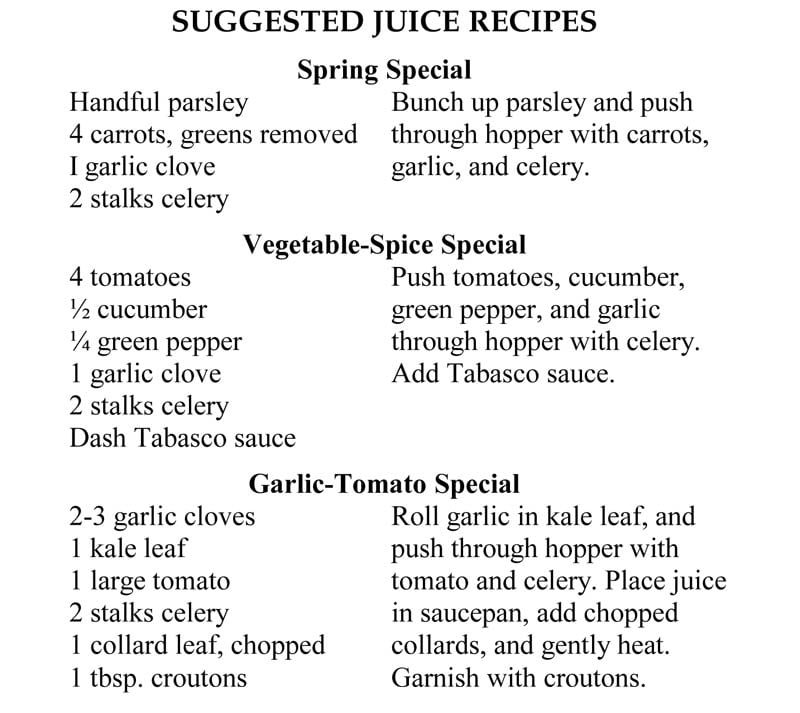
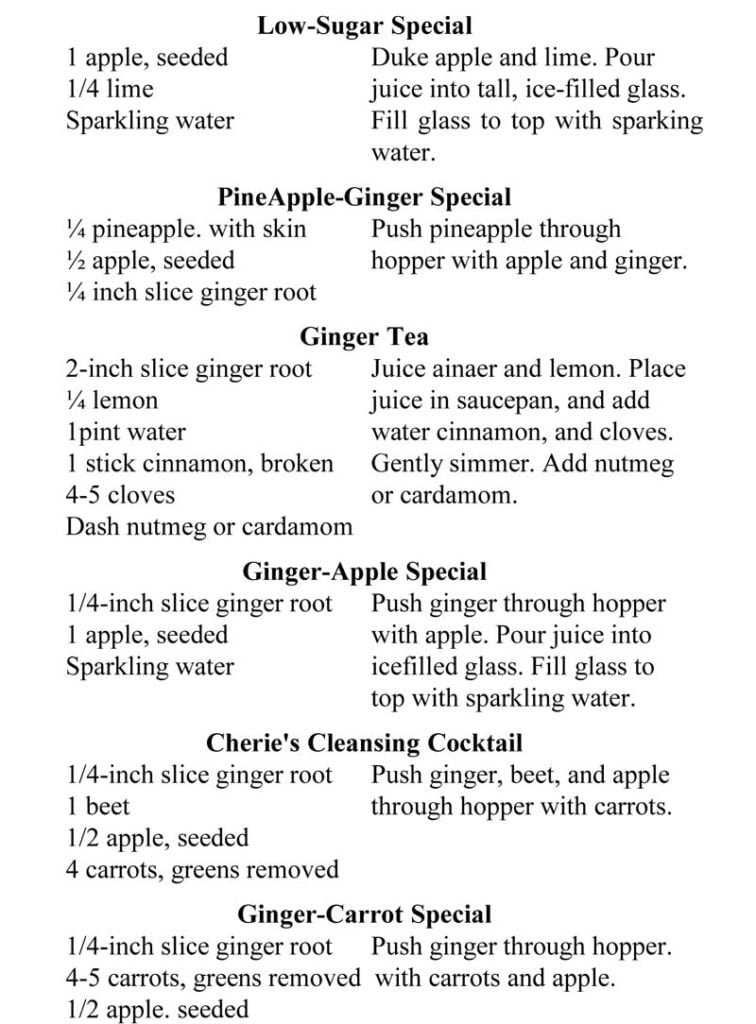
ALLERGIES
An allergy is a reaction to a substance that in nonsensitive persons would produce no effect. It is an antibody- antigen reaction that may be caused by the release of histamine or histamine-like substances from injured cells. The offending substance is known as an allergen and can be anything that brings on the symptoms of an allergy.
General Recommendations
Food allergies should be identified, and problem foods should be avoided. Blood tests are more effective than the skin scratch test in identifying food allergies. Certain additives, such as aspartame (Nutra Sweet), monosodium. glutamate (MSG), and sulfites, can also cause allergic reactions. In addition, an overgrowth of the yeast known as Candida albicans can cause a variety of food sensitivities. Either a blood test or stool culture can determine whether there is a yeast overgrowth present in the body.
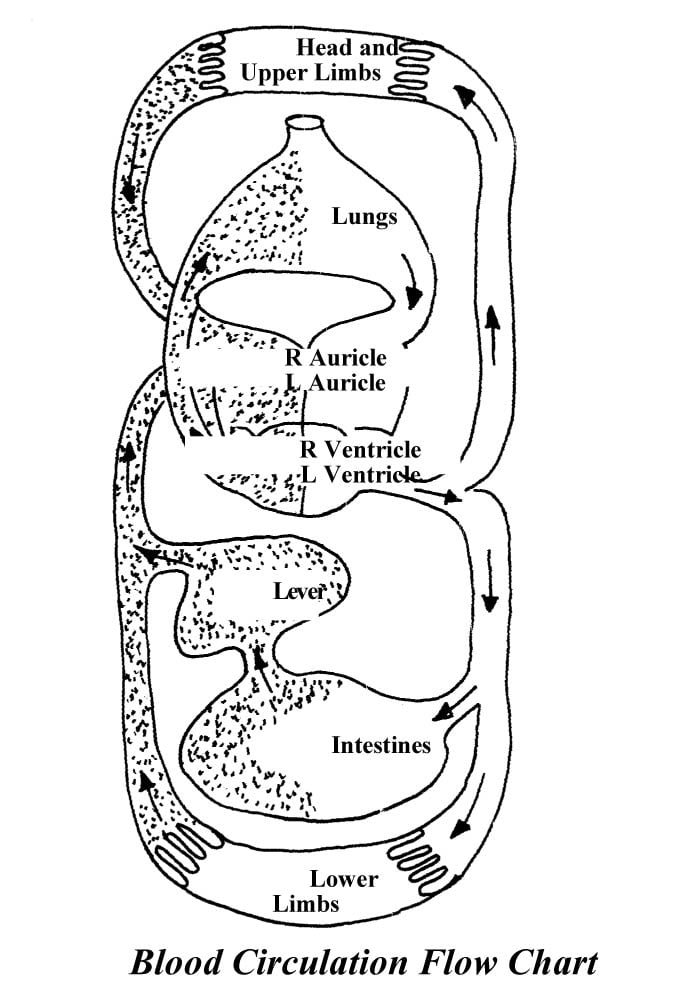
When this yeast overgrowth is brought under control, many people notice that their allergies and sensitivities have improved. In addition, the Juice Fast has been helpful for many allergy sufferers.
Nutrients That Help
- Vitamin B6 may be beneficial for MSG sensitivity.
- Vitamin B12 may have therapeutic benefits. Speak to your doctor about supplementation, as this nutrient cannot be obtained from juices.
- Vitamin C may reduce blood histamine levels and MSG sensitivity.
- Vitamin E has antihistamine activity.
- Molybdenum may be helpful, as this nutrient might be deficient in the majority of people with sulfite sensitivity.
- Lactobacillus acidophilus and Lactobacillus bifidus, may be beneficial, as a deficiency may exist with food allergies. Ask your doctor about supplementation, as these substances are not found in juices.
- Bloflavonolds potentiate the action of Vitamin C.
Beneficial Juices
Kale, spinach, and sweet pepper—sources of Vitamin B6.
Kale, parsley, and collared greens—sources of Vitamin C.
Spinach. asparagus and carrot—sources of Vitamin E. Cauliflower.
Orange, cantaloupe, and parsley—sources of bioflavonolds..
Dietary Modifications
Identify food allergies and eliminate those foods that cause symptoms.
Avoid additives that commonly cause reactions, including MSG, softies, and aspartame (Nutraftleet).
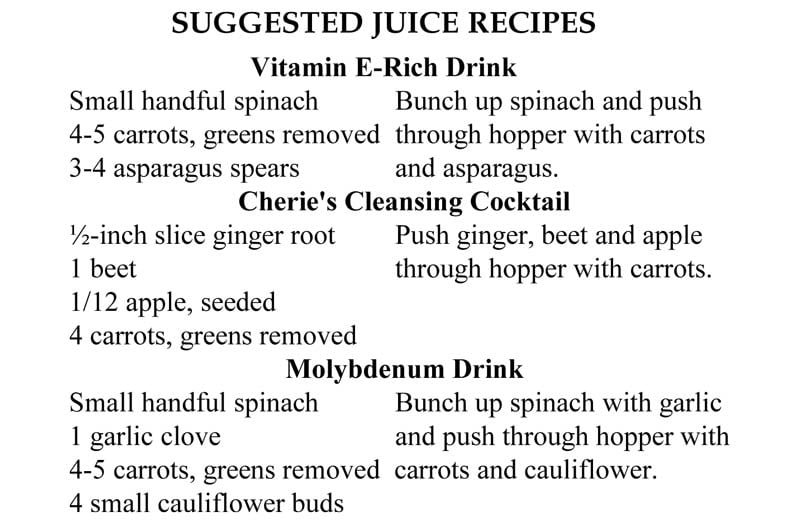
ASTHMA
Asthma is defined as difficulty in breathing accompanied by sporadic wheezing sounds caused by a spasm of the bronchial tube or a swelling of the mucous membranes.
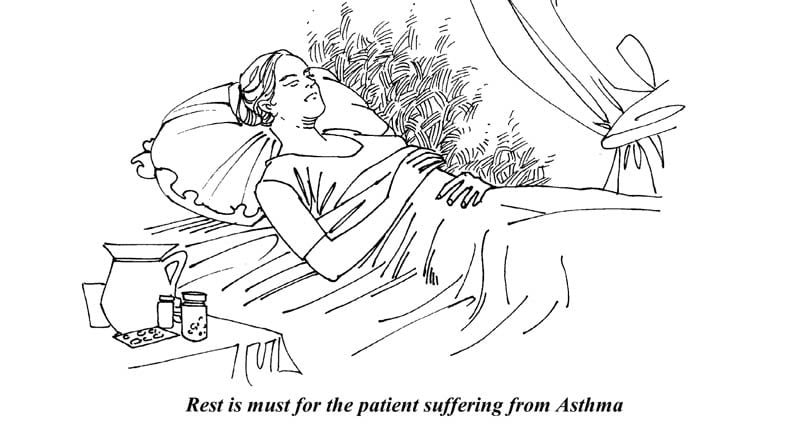
It is characterized by shortness of breath, coughing and expelling of mucus. Two types of asthma have been identified. One condition is caused by allergens, while the other develops without any specific allergens. In both cases, but particularly in the later, emotions must be considered as stress may cause or worsen asthmatic attacks.
Dietary Modifications
- According to recent studies, a vegetarian diet has been found to be helpful for the majority of asthmatics. The recommended diet excludes all meat, fish, eggs, and dairy products. (For children, especially, professional nutritional counselling is recommended to ensure that the vegetarian diet includes adequate protein during critical growth years. This is important for teenagers also.)
- Limit all animal products. The production of substances that contribute to the allergic and inflammatory reactions found in asthma come from arachidonic acid, a fatty acid found mainly in animal products.
- Drink pure spring water rather than chlorinated tap water.
- Eliminate all coffee, tea, chocolate, sugar, and salt.
- Every day, be sure to eat large portions of raw fruits and vegetables.
- Limit or eliminate all cereals except for buckwheat and millet.
- Identify all—food allergies. Particularly in infants and children—elimination diets (the identification of allergens by eliminating foods on a trial basis) have been successful in the treatment of asthma. Some of the most common allergens include milk, chocolate, wheat, citrus fruits, food colourings, eggs, fish shellfish, and nuts, particularly peanuts.
- Remove all food additives from the diet. Many preservatives and dyes have been reported to cause asthma attacks. Examples of additives include tartrazine, benzoates, sulphur dioxide and particularly, sulfites.
- Generously include onions and garlic in your diet, unless allergic, as they have been found to ward off an enzyme that generates an inflammatory chemical.
- Chili pepper has been used naturopathically to break an asthma attack. This food has been shown to have components that desensitize the airways to various irritants.
- For adults (not children under 17) a juice fast is recommended.
- Low stomach acid may be a contributing factor. See your doctor for testing.
- Avoid using aspirin and other nonsteroidal anti-inflammatory drugs, as they can bring on an asthma attack.
Try it also
- Mix two tablespoons of lemon juice with water and drink before meals.
- Make ginger tea by juicing a piece of ginger and simmering it in water. If desired add a little honey or lemon juice for taste. Drink before meals.
- Juice one red onion and mix with a small amount of honey. Take one teaspoon every hour during an attack.
- During an asthma attack, put your hands in hot—not scalding—water.
Nutrients That Help
- Vitamin B6 may be deficient in asthmatics. This supplement has been shown to decrease frequency and severity of wheezing and asthma attacks.
- Vitamin B12 may be deficient in asthmatics. With the addition of Vitamin B 12, patients in one study showed less shortness of breath during exertion. Speak to your doctor about supplementation, as this nutrient cannot be obtained from juices.
- Vitamin C is an antioxidant that can provide an important defence against bronchial constriction.
- Beta-carotene is effective in healing the epithelia lining of the respiratory tract.
- Vitamin E is an antioxidant that can inhibit the formation of inflammatory compounds.
- Selenium is effective in inhibiting the production of substances that stimulate bronchial constriction.
- Magnesium relaxes the bronchial muscle.
Beneficial Juices
- Kale, spinach, and turnip greens—sources of Vitamin B6.
- Kale, parsley, broccoli and spinach—sources of Vitamin C.

- Carrot, collard greens, kale, and parsley—sources of betacarotene and other carotenoids.
- Spinach, asparagus and carrot—sources of Vitamin E. Red Swiss chard, turnip, garlic and orange juice—sources of selenium.
- Beet greens, spinach, parsley and garlic—sources of magnesium.
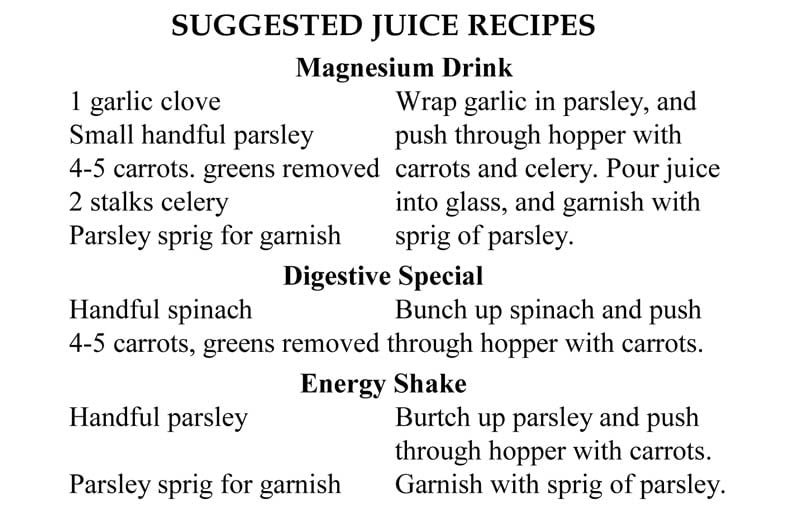

Hair Loss
Hair Loss (Alopecia) is natural or abnormal baldness or thinning of the hair. It can appear in patches or over the entire head. Hair loss can result from the aging process, surgery, radiation, severe illness, drugs, endocrine disorders such as hypothyroidism, sudden loss of weight, Vitamin or mineral deficiency (especially iron), over consumption of supplements such as Vitamin A and niacin, poor diet, stress, certain forms of dermatitis.

Pregnancy, and hereditary factors. There are over a dozen types of alopecia. Therefore, if you suddenly lose large amounts of hair, it may be appropriate to consult your physician to rule out any underlying medical problem that may be causing this loss. Be aware, though, that it is normal to lose about forty to eighty hairs per day.
General Recommendations
Some people lose hair after an illness because of an accumulation of oils, dead cells, and medication residues at the hair follicle. These residues can ‘choke’ the hair, causing it to fall out. Ask your beautician or beauty supply store about products that remove such residues from hair and scalp. A rinse of sage tea or apple cider vinegar can help hair grow, as can a scalp massage with ginger root juice tonic or with a tonic that combines cayenne pepper with Vodka. Lying on a slant board for 15 to 20 minutes per day will cause blood to flow to the scalp and daily scalp massages will also help improve circulation. To encourage hair growth, make an infusion with the herbs horsetail, catnip and southernwood and use as a rinse. Use only natural hair products; avoid using harsh chemical products on your hair.
Stimulating hair growth from within by the foods you eat is even more important than what you put on your scalp and hair. Vitamins, minerals, amino acids, and other nutrients provide the raw materials from which hair is produced. Our diet is too rich in foods that actually ‘starve’ the hair, such as fat, sugar and refined foods. You may need to make certain dietary modifications to encourage your hair to grow.
Dietary Modifications
Include plenty foods rich in sulphur—containing amino acids L-cysteine and Z-methionine, which are found in animal products (eggs are an especially rich source), legumes and cabbage. Skin, hair and nails contain some of the body’s most rigid proteins, all of which have a high sulphur content. Eat animal proteins in moderation, however an ample serving of lean meat, poultry or fish is three to five ounces, depending upon your body size. Eastern medicine says that eating too much meat can cause hair loss.
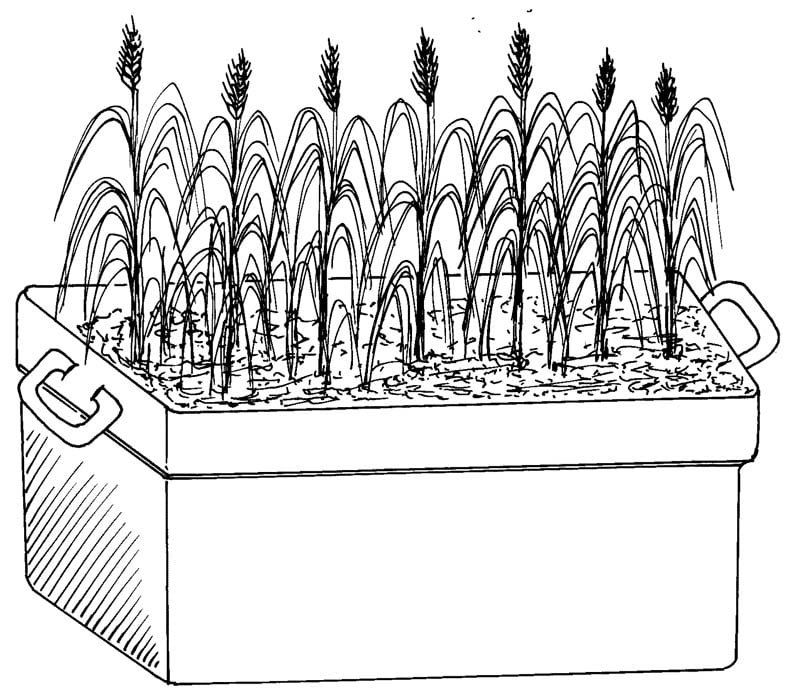
Cut down on sweets. Eastern medicine also says that too much sugar—especially fruit sugar (fructose)—can cause balding on the sides of the forehead. It is found that sugar is often a contributing factor in hair loss, and that after sugar is certain individuals, the hair-loss removed from the diets of certain individuals, the hair-loss process is either halted or totally or partially reversed.
Include foods rich in the D Vitamins, with special emphasis on choline, inositol and PABA. Choline is plentiful in eggs, wheat germ, legumes (beans, split peas, and lentils), oatmeal and brown rice. Lecithin, wheat germ, rice bran, whole wheat, and legumes are excellent sources of inositol PABA is found in mushrooms, cabbage, sunflower seeds, wheat germ, oats, spinach, and eggs.
Make sure that your diet contains ample essential JattV acids. Eat fish two or three times a week (not deep-fried). If your hair is dry and brittle, you may improve its texture by supplementing your diet with expeller-pressed flaxseed oil (b Primrose Oil Or Pure cold-or bottles), keep it only in refrigerated opaque bottles).
Nutrients That Help
B-complex Vitamins are essential for health and growth of hair.
Vitamin C helps to improve circulation to the scalp.
Vitamin E improves hair health and enhances hair growth
Beneficial juices
Green leafy vegetables—sources of B-complex Vitamins.
Kale, parsley, green Pepper, and broccoli—sources of Vitamin C.
Spinach, asparagus and carrot—sources of Vitamin E.
Alfalfa helps to stimulate hair growth.
Ginger juice used traditionally to stimulate circulation to the scalp.
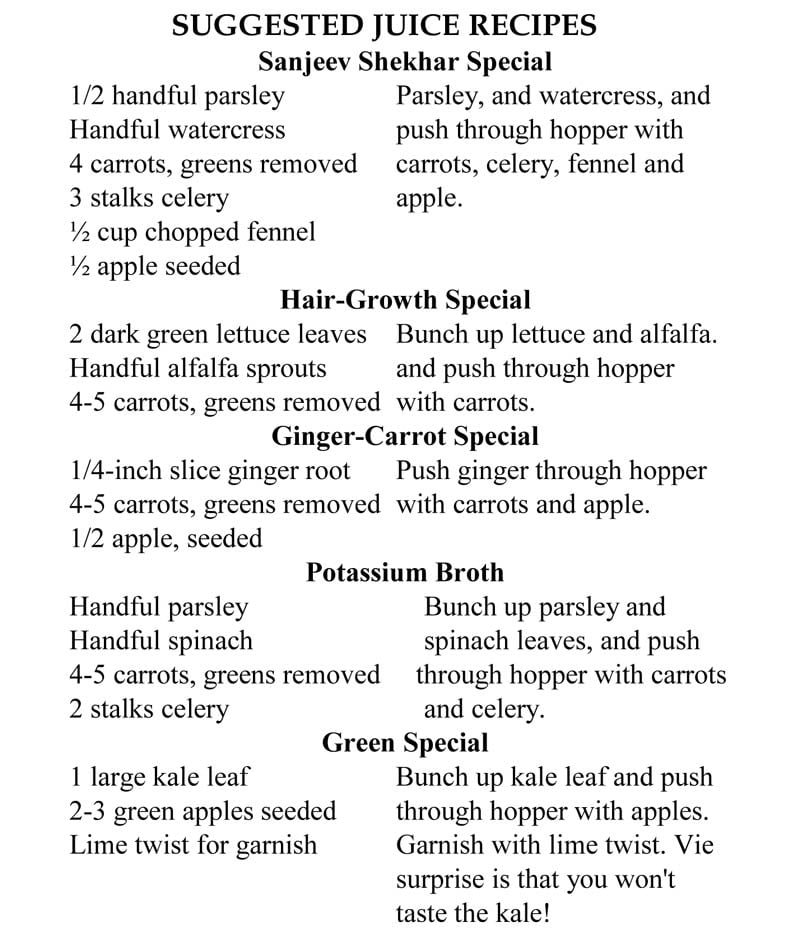
Hair Growth Tonics
Ginger Juice Tonic
1- to 2-inch piece ginger root
Juice ginger root. Pour the juice on your head and massage into the scalp. Let dry for 10-15 minutes; then shampoo. Ginger root juice has been used naturopathically to stimulate circulation to the scalp. Your head will feel a tingling sensation, as If It just had a Certs!
Cayenne Pepper Tonic
4 oz. red cayenne pepper
1 pint 100-proof vodka
Mix red cayenne pepper with vodka. Let sit for two weeks, shaking the mixture several times. Then strain until the liquid is pepper free. (A nylon stocking works well for straining.) This makes liquid capsicum pepper. (It is is not for drinkingi) Each day, apply this mixture to thinning or bald areas of the scalp. Within five or six weeks hair should begin to grow. This may not work for hereditary baldness.

